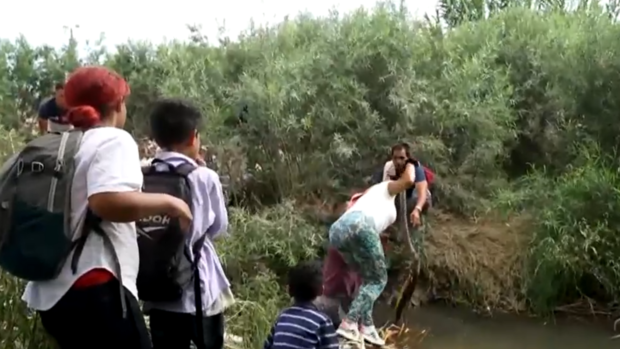Biden border action prompts concern among migrant advocates: "People are going to have fewer options to access protection"
Nogales, Arizona —A new executive action unveiled by President Biden this week that authorizes U.S. immigration officials to deport large numbers of migrants without processing their asylum claims has prompted concern among advocates, as migrants now face "fewer options to access protection."
Joanna Williams runs a shelter serving migrants in Nogales, Mexico, where migrants often wait to claim asylum in the U.S. In an interview with CBS News' Lilia Luciano, Williams said that what the new rule means for asylum seekers — who are often fleeing violence and seeking safety in the U.S. but are unable to get an appointment through a government app — is that "their other option is to try to go out into the desert and avoid finding border patrol."
"There was no part of this order today that extended any legal channels, that expanded options," Williams said of the president's action on Tuesday.
Mr. Biden has faced pressure for months to take action at the southern border, as immigration has become a key issue — especially among Republicans — heading into November's election.

The move, which has drawn stark pushback from the left, allows authorities to more quickly reject and deport migrants who enter the country unlawfully by suspending the processing of asylum claims between official entry points along the southern border. Migrant advocates view the move as an about face on U.S. asylum law, which allows migrants on American soil to request humanitarian protection.
The president defended the action, saying illegal border crossings remained historically high, while pointing to congressional Republicans' rejection of border security legislation negotiated on a bipartisan basis earlier this year that this executive action mirrors in part.
Still, Williams explained that deterrence policies have been in effect for over two decades at the southern border, saying "what they lead to is an increase in deaths."
The partial ban on asylum will not apply to unaccompanied children, individuals with acute medical conditions or who are fleeing imminent harm or who are using legal pathways to enter the U.S., and it would be rolled back after 14 days if the weekly average of daily illegal border crossings falls below 1,500. The American Civil Liberties Union said it will challenge the executive action in court.
Lilia Luciano
Lilia Luciano is an award-winning journalist and CBS News 24/7 anchor and correspondent based in New York City. Luciano is the recipient of multiple journalism awards, including a Walter Cronkite Award, a regional Edward R. Murrow Award and five regional Emmys.
TwitterDisclaimer: The copyright of this article belongs to the original author. Reposting this article is solely for the purpose of information dissemination and does not constitute any investment advice. If there is any infringement, please contact us immediately. We will make corrections or deletions as necessary. Thank you.







